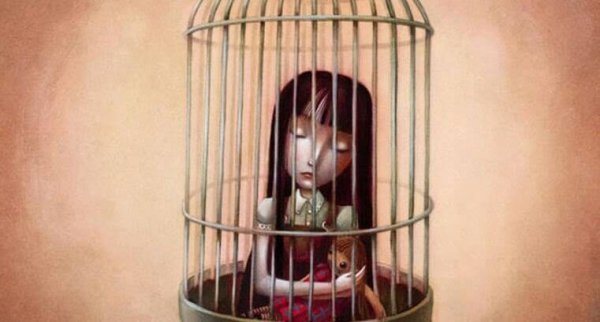Invisible Family Contracts

Many of you have probably seen how loyalty and closeness between certain family members prevented another from fulfilling a dream. There’s a term for this in psychology: invisible family contracts or loyalties.
This is defined as a set of beliefs and inhibitions we learn from our families that shape how we see ourselves and how we act in relation to our emotions (both the ones we experience and the ones we “allow ourselves to desire”). In other words, we inherit our families’ problems.
In short, we accept certain conditions because we’re afraid of losing the love, attention, and respect of our family members (parents, grandparents, siblings, etc). Naturally, this results in a developmental fear, because nobody wants to be disowned.
We can also use this emotional power to our own advantage, which is motivated by cruel intentions. In fact, we’re often not even aware of how we play with the family contract. Let’s look at this further:

Unspoken emotional contracts: a cocktail of expectations
Emotional contracts that are established between family members turn into a cocktail of high expectations that are often poisonous to one’s potential for self-actualization.
When we talk to people who have nothing to do with our family, we often realize how we structure our thoughts and attitudes about certain topics. We’re suddenly surprised when we become aware that we’ve accepted certain ideas from our families that we thought were indisputable, but that aren’t necessarily so in reality.
It’s very important to get rid of all our negative preconceived notions.

Look at the case of the artist who was disowned by his family who wanted to continue their legacy of renowned doctors. Look at the woman who thinks her only future is to marry a man who will take care of her.
Look at the people who don’t dare to move to a new city because it would hurt their family. Look at the people who can’t love freely because they’re afraid of retaliation. Look at the son who thinks he should like football. Look at the people who want to study something they have “no future in.” Look at the people who think life has no meaning without a romantic partner.
Look at the labels “bad,” “smart,” “awkward,” “attractive,” “goody-two-shoes,” “helpful,” “ugly,” “apathetic,” “outcast,” “dependent,” etc, etc. Look at all of them.
When a person seeks help, it’s usually the case that the root (but not the only) cause of their suffering is that they’ve learned dysfunctional schemas from their families since childhood.
In other words, we suffer because our families’ shortcomings, beliefs, and expectations get transferred onto us. This is normal, and as we’ve already said, developmental. However, this doesn’t mean that when we get to a certain point in life, we should start to question everything about the world (we realize that we hadn’t developed this capacity as children, but that we can explore it as adults.)

“Who am I?” Having a conversation with yourself
We are sponges of beliefs and expectations, which is a disadvantage when our invisible family contracts or loyalties inhibit our growth. The direct consequence of this is that we are what we see. So we don’t usually look beyond the things we’ve seen at home and what our families told us about life.
For example, we often believe that partners should be together forever, because our parents have endured it all and have sacrificed their lives for the happiness of their children. So if we get involved in a dysfunctional relationship in the future, it’s probably hard to see that we don’t have to subject ourselves to that.

Regardless of whether you’ve become aware of invisible family contracts or not, it’s important to examine who you are and why you’re used to behaving in a certain way. If you realize that you’re merely copying your family, and that these attitudes and beliefs are making you unhappy, the best thing to do is to release yourself from them.
You could do this by writing a letter to yourself or having a conversation with yourself. This will help you to free yourself from the invisible family loyalties that torment you. However, if this isn’t enough, or if you think you can’t do it, you should consult a professional who can help you understand your emotions.
Many of you have probably seen how loyalty and closeness between certain family members prevented another from fulfilling a dream. There’s a term for this in psychology: invisible family contracts or loyalties.
This is defined as a set of beliefs and inhibitions we learn from our families that shape how we see ourselves and how we act in relation to our emotions (both the ones we experience and the ones we “allow ourselves to desire”). In other words, we inherit our families’ problems.
In short, we accept certain conditions because we’re afraid of losing the love, attention, and respect of our family members (parents, grandparents, siblings, etc). Naturally, this results in a developmental fear, because nobody wants to be disowned.
We can also use this emotional power to our own advantage, which is motivated by cruel intentions. In fact, we’re often not even aware of how we play with the family contract. Let’s look at this further:

Unspoken emotional contracts: a cocktail of expectations
Emotional contracts that are established between family members turn into a cocktail of high expectations that are often poisonous to one’s potential for self-actualization.
When we talk to people who have nothing to do with our family, we often realize how we structure our thoughts and attitudes about certain topics. We’re suddenly surprised when we become aware that we’ve accepted certain ideas from our families that we thought were indisputable, but that aren’t necessarily so in reality.
It’s very important to get rid of all our negative preconceived notions.

Look at the case of the artist who was disowned by his family who wanted to continue their legacy of renowned doctors. Look at the woman who thinks her only future is to marry a man who will take care of her.
Look at the people who don’t dare to move to a new city because it would hurt their family. Look at the people who can’t love freely because they’re afraid of retaliation. Look at the son who thinks he should like football. Look at the people who want to study something they have “no future in.” Look at the people who think life has no meaning without a romantic partner.
Look at the labels “bad,” “smart,” “awkward,” “attractive,” “goody-two-shoes,” “helpful,” “ugly,” “apathetic,” “outcast,” “dependent,” etc, etc. Look at all of them.
When a person seeks help, it’s usually the case that the root (but not the only) cause of their suffering is that they’ve learned dysfunctional schemas from their families since childhood.
In other words, we suffer because our families’ shortcomings, beliefs, and expectations get transferred onto us. This is normal, and as we’ve already said, developmental. However, this doesn’t mean that when we get to a certain point in life, we should start to question everything about the world (we realize that we hadn’t developed this capacity as children, but that we can explore it as adults.)

“Who am I?” Having a conversation with yourself
We are sponges of beliefs and expectations, which is a disadvantage when our invisible family contracts or loyalties inhibit our growth. The direct consequence of this is that we are what we see. So we don’t usually look beyond the things we’ve seen at home and what our families told us about life.
For example, we often believe that partners should be together forever, because our parents have endured it all and have sacrificed their lives for the happiness of their children. So if we get involved in a dysfunctional relationship in the future, it’s probably hard to see that we don’t have to subject ourselves to that.

Regardless of whether you’ve become aware of invisible family contracts or not, it’s important to examine who you are and why you’re used to behaving in a certain way. If you realize that you’re merely copying your family, and that these attitudes and beliefs are making you unhappy, the best thing to do is to release yourself from them.
You could do this by writing a letter to yourself or having a conversation with yourself. This will help you to free yourself from the invisible family loyalties that torment you. However, if this isn’t enough, or if you think you can’t do it, you should consult a professional who can help you understand your emotions.
This text is provided for informational purposes only and does not replace consultation with a professional. If in doubt, consult your specialist.







